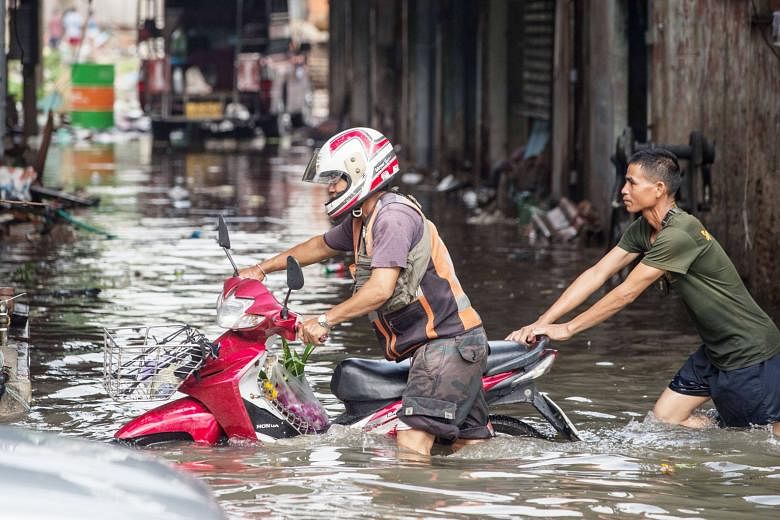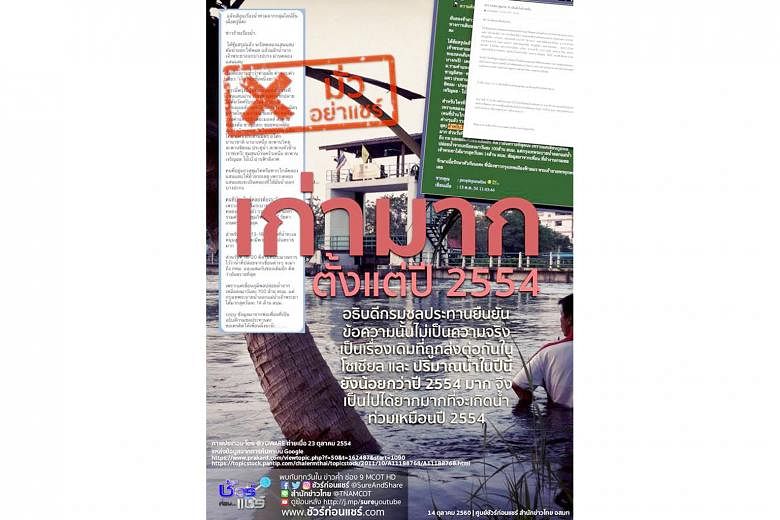BANGKOK • When heavy downpours inundated many places in Bangkok earlier this month, the relevant authorities rushed to control not only the flood of water, but also of misinformation and hoaxes.
Fake news operators were spreading rumours that the Bhumibol Dam and many other major dams in the north had released water through the Chao Phraya River to flood the Thai capital, as had happened in 2011.
Heavy rain of 214mm had already pushed the limits of the current system's drainage capacity, causing flash floods in 55 locations across Bangkok.
Government spokesman Sansern Kaewkamnerd, Bangkok Governor Aswin Kwanmuang and Irrigation Department chief Somkiart Prajamwong mobilised resources to fight such misinformation on social media networks, mostly on Line and Facebook, saying that Bhumibol Dam never released 100 million cubic metres of water a day downstream.
As images, information and infographics of the 2011 disaster overwhelmed social media during that time, Mr Peerapon Anutarasoat - page administrator of @SureAndShare, Thailand's fact-checking site - had to produce information to calm public sentiment.
"It's fake, don't share," an infographic on the site's Facebook page said.
Mr Peerapon, a journalist at the state-run Thai News Agency, set up SureAndShare with a few colleagues in 2015 to counter fake news.
It began with a weekly television programme, and later became a daily programme on a channel under the Mass Communication Organisation of Thailand company.
The team also launched a bot-style service on the Line app, where people can share what is suspicious and get answers.

The project's nearly 400 videos and over 100 infographics cover around 80 per cent of misinformation spreading among the Thai people, he said.
Fake news, misinformation, hoaxes and rumours are not new to Thai society, said Chulalongkorn University's head of journalism department, Assistant Professor Pijitra Tsukamoto, adding that the big worry is that they "move quickly in online platforms". Her research shows that Twitter is one of the powerful engines used to spread fake news.

Victims of fake news could be anybody. Major Thai-language newspapers Thai Rath and Matichon, for instance, have not been spared.
A fake Matichon site recently reported that a KFC staff member was fired for using his feet, rather than his hands, to prepare chicken.
The paper's real website refuted the report, and a student in the picture notified the police that his image was being used for fake news.
He used to work part-time at a KFC outlet as a cashier and never prepared food.
Thai Rath has warned its readers to beware of fake sites, which have different URL links. While the real website is on Thairath.co.th, fake sites have URLs like thairath-online.com, it said.
Mr Peerapon and Prof Pijitra admitted that it is not easy to counter fake news. "We have to speedily compete with fake news in order to bring true information to the public," Mr Peerapon said.
"The problem is that sometimes, we cannot check true stories timely enough, while the fake news has travelled faster."
Prof Pijitra said: "Social media algorithms cannot effectively transmit real news to reach out to people. Sometimes we find that real and fake news run parallel to each other." THE NATION/ASIA NEWS NETWORK
SEE INSIGHT
Reports fabricated for views, attention
Regulating chat groups, news reporting


